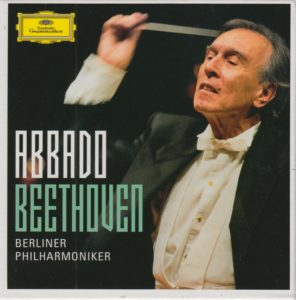 My listening post this morning is my home, so early in the morning the lights inside don’t seem to be able to pierce the darkness coming in from without.
My listening post this morning is my home, so early in the morning the lights inside don’t seem to be able to pierce the darkness coming in from without.
If it weren’t for the cup of coffee beside me (Trader Joe’s Light Roast), my eyelids would start to droop.
(And, by that, I don’t mean I apply the coffee directly to my eyeballs. It gets to them eventually.)
Also helping to keep me alert are Queen’s first five CDs playing in the background.
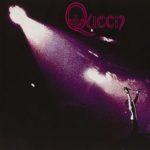 “Liar,” from Queen I, is currently serenading me while I prepare to pop in the earbuds and listen to Italian conductor Claudio Abbado (1933-2014), Berliner Philharmoniker, and Beethoven Symphony No. 8 in F major, Opus 93.
“Liar,” from Queen I, is currently serenading me while I prepare to pop in the earbuds and listen to Italian conductor Claudio Abbado (1933-2014), Berliner Philharmoniker, and Beethoven Symphony No. 8 in F major, Opus 93.
I’m going to be honest: I didn’t care for the Queen movie Bohemian Rhapsody. I fully realize I’m in the minority on this one. But I couldn’t willingly suspend disbelief that they were just four actors playing Queen, and that Rami Malek‘s Freddie Mercury was so low key – despite Freddie’s real-life flamboyant self – I couldn’t believe a guy that reserved most of the time could have been the creative spark behind a band as hyper-creative as Queen.
Oh, sure. Malek occasionally played manic, showing Freddie with spurts of creative genius and wild imagination. But there’s a difference between playing a guy with enormous creative energy and actually being a guy with enormous creative energy. The former can be faked. The latter cannot be. Not even by a really good actor.
Anyway, Rotten Tomatoes (the movie rating aggregation site) gives the movie a 62% critic rating and a 92% audience rating.
Guess which category I’m in.
Okay, on with today’s Beethoven symphony, his Eighth, of which its entry on Wikipedia tells us this:
The Symphony No. 8 in F major, Op. 93 is a symphony in four movements composed by Ludwig van Beethoven in 1812. Beethoven fondly referred to it as “my little Symphony in F,” distinguishing it from his Sixth Symphony, a longer work also in F.
The Eighth Symphony is generally light-hearted, though not lightweight, and in many places cheerfully loud, with many accented notes. Various passages in the symphony are heard by some listeners to be musical jokes. As with various other Beethoven works such as the Opus 27 piano sonatas, the symphony deviates from Classical tradition in making the last movement the weightiest of the four.
The work was begun in the summer of 1812, immediately after the completion of the Seventh Symphony. At the time Beethoven was 41 years old. As Antony Hopkins has noted, the cheerful mood of the work betrays nothing of the grossly unpleasant events that were taking place in Beethoven’s life at the time, which involved his interference in his brother Johann’s love life. The work took Beethoven only four months to complete, and is, unlike many of his works, without dedication.
The premiere took place on 27 February 1814, at a concert in the Redoutensaal, Vienna, at which the Seventh Symphony (which had been premiered two months earlier) was also played. Beethoven was growing increasingly deaf at the time, but nevertheless led the premiere. Reportedly, “the orchestra largely ignored his ungainly gestures and followed the principal violinist instead.”
From the William and Gayle Cook Music Library (Indiana University School of Music) comes this title page from Beethoven’s Eighth:
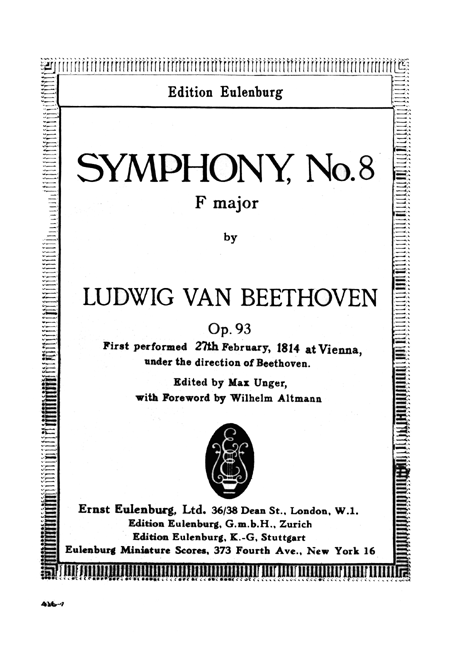
And this, the first page of the first movement:
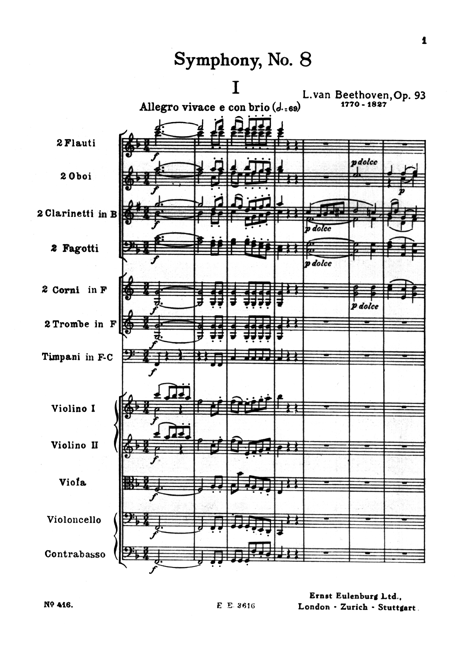
I’ve encountered Maestro Abbado seven times prior to this morning, on…
Day 1. Rating: None. [I have know idea why.]
Day 19. Rating: “Meh!”
Day 37. Rating: “Meh!”
Day 55. Rating: “Huzzah!”
Day 73. Rating: “Meh!”
Day 91. Rating: “Huzzah!”
Day 109. Rating: “Huzzah!”
Not a bad record, frankly. Not stellar. But above average.
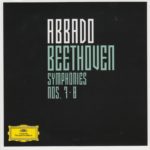 Beethoven wrote his symphonies in four parts (except for the Sixth, which is in five). The time breakdown of this particular one (Symphony No. 8 in F major), from this particular conductor (Abbado, at age 68) and this particular orchestra (Berliner Philharmoniker), at this particular time in history (February, 2001) on this particular record label (Deutsche Grammophon) is as follows:
Beethoven wrote his symphonies in four parts (except for the Sixth, which is in five). The time breakdown of this particular one (Symphony No. 8 in F major), from this particular conductor (Abbado, at age 68) and this particular orchestra (Berliner Philharmoniker), at this particular time in history (February, 2001) on this particular record label (Deutsche Grammophon) is as follows:
I. Allegro vivace e con brio…………………………………..9:21
II. Allegretto scherzando…………………………………….4:13
III. Tempo di menuetto……………………………………….5:48
IV. Allegro vivace………………………………………………….7:12
Total running time: 26:34
My Rating:
Recording quality: 4 (sounds a little fuzzy to me, a little top end seems to be missing, the overall sound is a bit mushy, a few ambient sounds throughout, and tape hiss)
Overall musicianship: 5 (inspired, energetic, passionate)
CD liner notes: 4 (liner notes consist of all necessary technical detail, plus an essay about Abbado’s approach to conducting Beethoven, translated into E/G/F/I, but virtually nothing about Beethoven himself or his symphonies)
How does this make me feel: 4 (“Huzzah!”)
Now I remember why I didn’t rate the fist Abbado performance: I have no reference point. I don’t know if this is a great performance or not. I could rate this “Meh!” or “Huzzah!” and I wouldn’t know the difference until I listened to a few more performances by other conductors/conductors. But, by then, I’ll have forgotten what this sounds like.
Despite a bit of sonic challenges (it just sounds fuzzy to me), I have to rate this based on what I hear of the performance itself.
And what I hear is a very fun symphony played well.
At this point I can’t pick a favorite movement. To me (at this point in my listening) they don’t seem that different from one another. As my project rolls on, I’ll hear different things and form new opinions. For now, I’m content to listen to this performance.
“Huzzah!”
